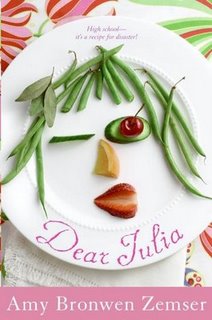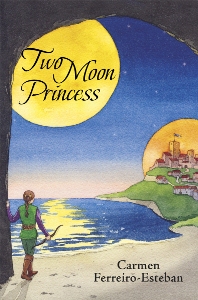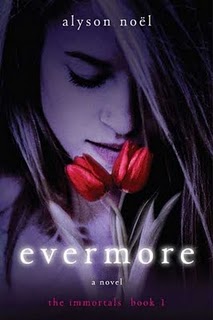Elaine Hamilton has been cooking since she was small. Her idol is Julia Child, and she decided very early on (age 6, to be exact) that she wanted to be exactly like her. Elaine’s father bought her a boxed set of Mastering the Art of French Cooking (volumes one and two) when she was eight, and she has spent the past nine years memorizing and mastering the recipes. All but the lowly omelette — that she cannot make.
Every time Elaine hits a snag in her cooking, she writes a letter to Julia Child. Except that she doesn’t mail them. They sit in a trunk in her room, testimonies to her passion, her desire to be a chef, and … to her inability to make friends.
That is, until Lucida Sans (yes, she’s named after the computer font) comes into Elaine’s life. With a bang. Literally. They form an unusual friendship, which leads (because of Lucida’s weakness for a certain handsome cad) to an attempt at a cable show and, ultimately, to the Young Chef’s American Culinary Competition.
In some ways, the book is absolutely delightful. It has a fairy-tale quality that is often entertaining and charming. Although the narrator could, at times, be annoying, getting in the way of the story, the characters and tone more often than not balance that annoyance out. Both Elaine and Lucida are fun, sweet, enjoyable characters. Even the cad is amusing with all his preening and begging.
But with all the sweetness, there is an underlying brashness. Elaine’s mother, an old-school feminist and a Congresswoman, dislikes her daughter’s love of cooking. In fact, a passage on the first page underscores this quite well:
“Oh, Elaine,” she had said, hurriedly stuffing papers into her briefcase, “Can’t you aspire to something higher? Twenty years since liberation and you want to stay home and slave over a burner?”
In no way is Elaine’s mother a sympathetic character; she spends the entire book underappreciating her daughter’s ability and trying to force her daughter to be exactly like her. (While Elaine’s brothers are free to do what they will.) It is at the very least, disturbing, and often infuriating.
In the end, though, the fairy-tale-ness of the book wins out; Elaine and Lucida are able to save the day, and the world is a better, happier place for the existence of French cooking. Very enjoyable.
Rated: None. (There’s a cross-dressing brother, and the parents of her friend are a gay couple, but there’s no explicit language, situations, or anything else.)




